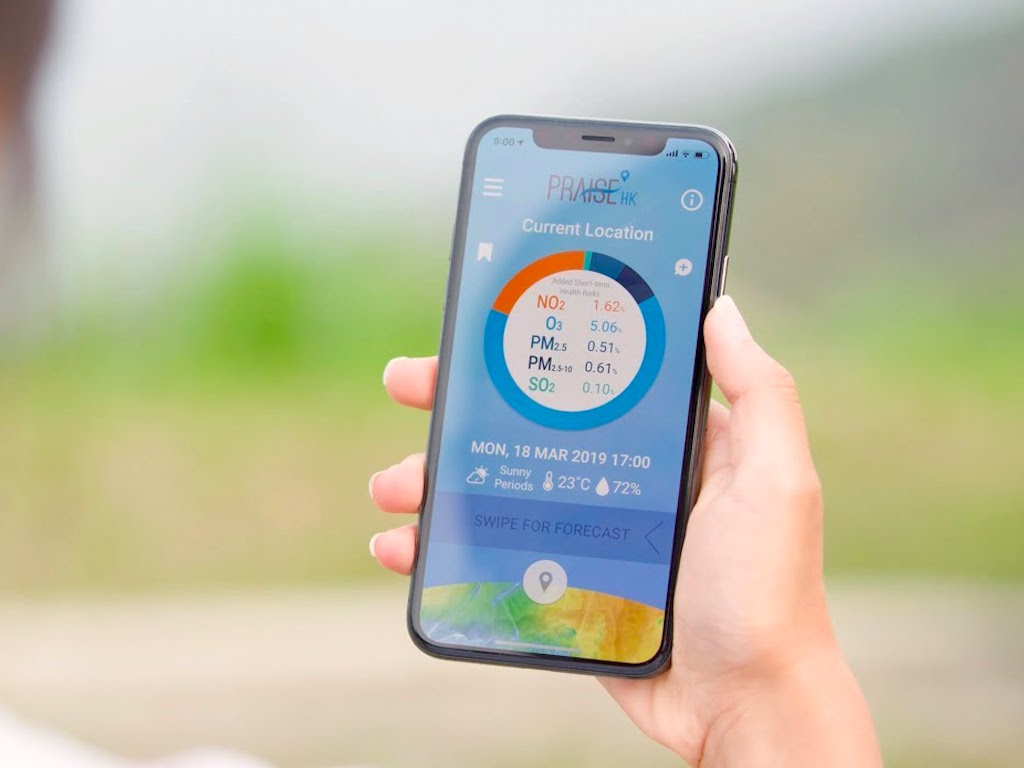3 Mins Read
A new app developed by the Institute for the Environment under the Hong Kong University of Science & Technology (HKUST) has recently launched to enable the public to make more informed choices that reduce their personal exposure to outdoor air pollution. The phone app, dubbed PRAISE-HK, aims to help Hong Kongers make better individual travel and activity decisions the city with real-time air quality data and predictive modelling that can estimate air quality levels 48-hours in advance. Having already launched Phase 1 this year, the PRAISE-HK team hopes to roll out further improvements including indoor air pollution data and interactive health alerts based on personal responses to pollutants.
PRAISE-HK is a smart city phone app that allows for real-time and forecasted air quality and health risk information down to the street level. For current air quality information, the app uses Air Quality Health Index (AQHI) provided by the government’s Environmental Protection Department (EPD) data calculated using correlation to short-term health risk of pollution-related hospital admissions. While the AQHI can provide district and regional level information based on its 16 site sensor stations, the PRAISE-HK app relies on modelling sensor data to increase the accuracy down to a 2-metre radius, as well as providing users with predictive forecasts up to 48 hours in advance.
This information can empower individuals to make healthier choices, from choosing a cleaner, less polluted route to planning outdoor activities accordingly. Last week, experts at the AWA panel talk on air pollution, which was moderated by Green Queen’s founder Sonalie Figueiras, discussed some of the associated serious health risks. These ranged from adverse birth outcomes to exacerbating pre-existing issues like eczema and asthma, and negative effects on Vo2 max if exercising and working during poor air quality episodes. Scientific studies have reiterated the harmful consequences that can stem from air pollution, with a recent piece of research in China finding a link between toxic air and silent miscarriages.
READ: 8 Things You Need To Know About Hong Kong Air Pollution
PRAISE-HK’s modelling technology, the Atmospheric Dispersion Modelling System (ADMS), is based on a combination of pollution data sources. In addition to government provided AQHI data, the app draws in data from weather conditions that could disperse emissions regionally and affect photo-chemical reactions, traffic or roadside emission patterns, sensor technologies for microenvironment pollution and “big data” to raise the precision of real-time performances. It also relies on users’ GPS accuracy to properly show each individual’s personalised exposure to pollution in the surrounding area.
“We have entered the Artificial Intelligence era. We could and we should combine innovations and new technologies to solutions for a smarter and healthier living style,” remarked the app’s Principal Investigator Alexis Lau.
At the recent talk on Hong Kong’s air pollution, panelist and Senior Communications Manager of PRAISE-HK Michelle Wong shared that the team is currently looking to develop even more personalised air pollution data and health alerts. The later phases of the app will feature major upgrades such as identifying air pollutants that users are sensitive to, based on both their modelling system and individual data input, and alerts that recommend in advance cleaner transport routes. Other plans include developing a 3-day advance forecast, including in indoor environments.
The PRAISE-HK app is available for free on iPhone via the Apple Store and Google Play- download here.
Lead image courtesy of PRAISE-HK.




